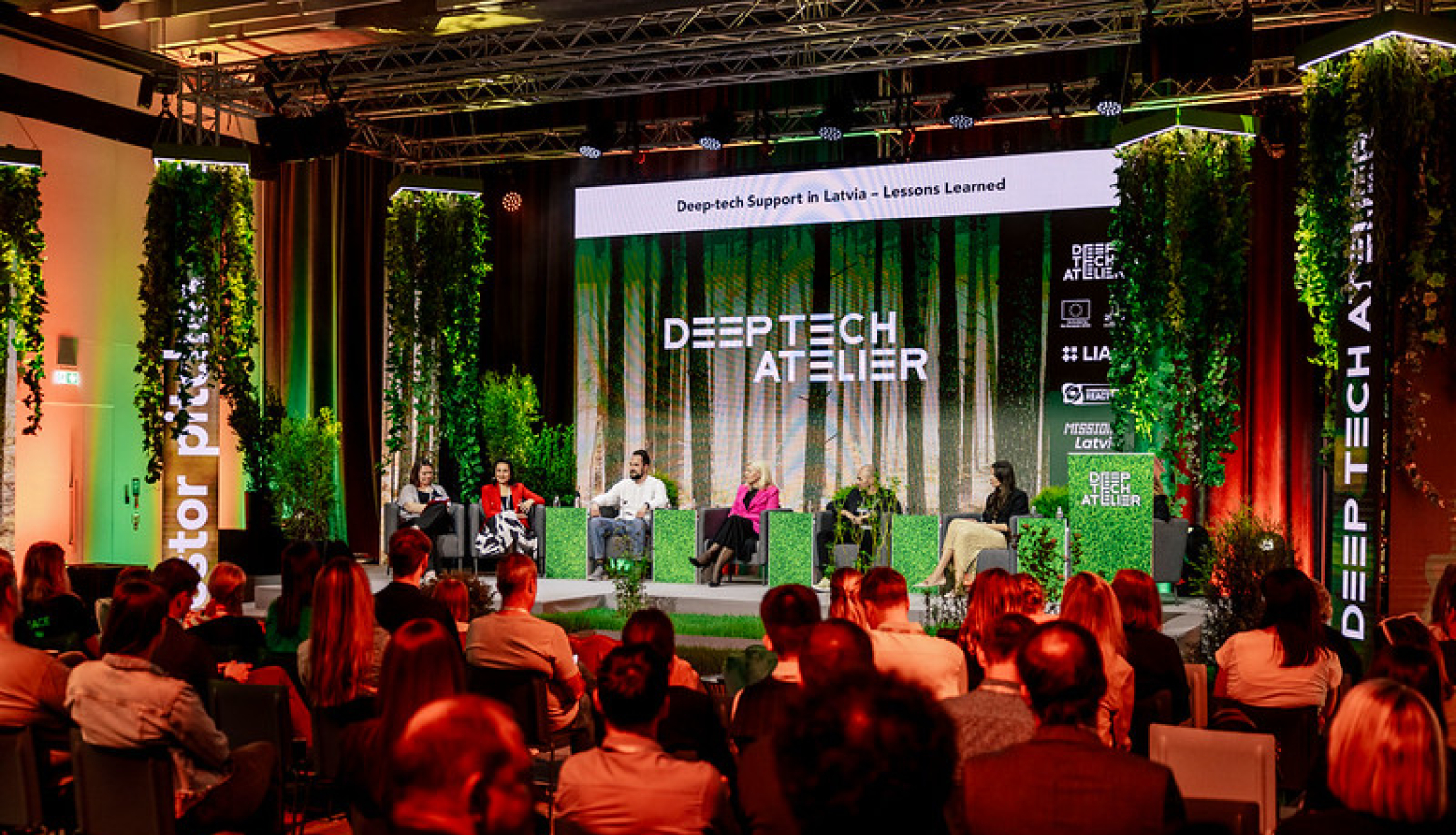On 15 and 16 May, science-based technology conference Deep Tech Atelier 2025 will take place in Riga. This year, there will be a special panel at the conference dedicated to innovation in defence and on how new technological solutions can strengthen security of the Baltic countries, says Agnese Oļševska, Deputy Director for Innovation at the Export and Innovation Services Department of the Investment and Development Agency of Latvia.
Deep Tech Atelier will take place in Riga for the seventh year, and each year the theme of the conference is adapted to the current developments in the world, and in particular to the needs of Latvia and the Baltics.
To register for the conference, visit deeptechatelier.com.
“Innovation in defence is no longer a desirable, but a geopolitical necessity in today’s reality, therefore this year speakers on the Deep Frontier Stage will address such issues as the role of artificial intelligence and robotics in modern-day defence, how to build effective cross-border cooperation, developing a strategy for resilient infrastructure, the potential of private-public cooperation to foster defence innovation, and others,” explains Oļševska.
The conference session dedicated to defence will be opened on 16 May by Diāna Baranova, Director of the Defence Industry and Innovation Policy Department at the Ministry of Defence of the Republic of Latvia.
A delegation from the German state of Mecklenburg-Vorpommern will attend Deep Tech Atelier. Manuela Schwesig, Prime Minister of the state, and several companies, for example, Maritimes Brand- und Sicherheitszentrum Ostsee from Rostock, which specialises in maritime security technology, will participate in a session on security technology.
Other speakers will include Artis Pabriks, former Minister of Defence and head of the Military Technology, Drone and Robotics Association, Veiko-Vello Palm, former Estonian Deputy Chief of Defence and CEO of Frankenburg Technologies (Estonia), Hans Kristensen, Manager of Small Sat Systems Engineering and AIT at Kongsberg Defence & Aerospace (Norway), Teemu Seppälä, Director of Technology and Innovation in the Town of Riihimäki and a representative of Defence Innovation Network Finland, Kaspars Pollaks, Director of LMT Defence, Glen Grant, military expert and lecturer at Riga Business School, and others.
“Defence technology startups are essential because they bring flexibility, innovation and new approaches to national security ecosystems. At a time when traditional defence companies are slow to innovate, startups are rapidly developing artificial intelligence, autonomous systems, cybersecurity and space technologies. In Europe, investment in defence startups is growing, with venture capital investment in this business segment amounting to USD 5.2 billion in 2024, according to Dealroom. This goes to show that such startups are believed to have great potential,” says Oļševska.
In Latvia, the Cabinet of Ministers has also recently approved funding for the country’s first pre-acceleration programme in defence. In 2025–2026, annual funding of EUR 226,000 will be divided among four universities: Latvia University of Life Sciences and Technologies, the University of Latvia, Riga Stradiņš University, and Riga Technical University.
However, we already can take pride in a number of startups whose technologies are widely used. Furthermore, in the case of Latvia, companies often demonstrate that their technologies can be used in two ways – for their primary purpose, such as research, agriculture and others, and for their secondary purposes, such as defence.
For example, Atlas Dynamics is a manufacturer of industrial drones that has already delivered several hundred counter-intelligence drones to Ukraine. ENTANGLE is developing devices that can be connected to a smartphone to make public mobile networks secure. They use quantum encryption to protect critical infrastructure and industrial IoT systems.
Mosphera manufactures industrial electric vehicles for on- and off-road use. They are high-end scooter-style vehicles meant for a variety of industries, including agriculture, airports, military, the police, border control, and others.
SUBmerge Baltic, on the other hand, specializes in the development of autonomous underwater drones for a wide range of operations. The company’s main objective is to contribute to the exploration and understanding of the marine environment, but the technology it has developed also offers opportunities in defence.
“These are just a few examples of startups already operating in Latvia. Their technologies are at different stages of development – both additional funding and industrial partners are needed, which is one of the objectives of the conference. Deep Tech Atelier is a platform where different parties can meet – policymakers, investors, entrepreneurs, researchers and technology developers,” adds Oļševska.
Deep Tech Atelier, the largest science-intensive entrepreneurial ecosystem conference in Northern Europe, will take place this year on 15 and 16 May at Fantadroms. Over 100 speakers and discussion participants will take to the conference’s three stages – Deep Tech, Deep Frontier, and Growth Stage during the two days. More than 40 different subjects will be covered: industry news and trends, artificial intelligence, research-business collaboration, fundraising, space and related matters, quantum technologies, security and defence technologies.
This year, particular attention will also be paid to science communication and how scientists communicate with the public, including investors, as this can be the key to commercializing discoveries. On 16 May, a programme celebrating women’s excellence in science and technology will be launched in cooperation with Riga TechGirls.
The cooperation partners of Deep Tech Atelier 2025 are Labs of Latvia, Hello Tomorrow, Riga Technical University, University of Latvia, Riga TechGirls, Latvian Space Industry Association, and international science commercialization platform Commercialisation Reactor.
The event funding is provided by the ERDF projects “Development of Innovative Entrepreneurship of SMEs” and “Support for Improving Technology Transfer System”, the Recovery and Resilience Facility, and the state budget.
The views and opinions expressed are those of the author(s) alone and do not necessarily reflect the opinion of the European Union or the European Commission. Neither the European Union nor the European Commission is responsible for these views and opinions.
Further information for media representatives:
Tija Ezeriņa
Public Relations Adviser for Deep Tech Atelier 2025
M: 29719893, E: tija.ezerina@publicid.lv



